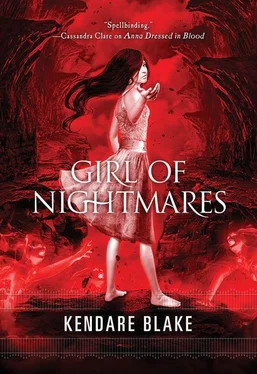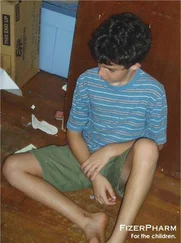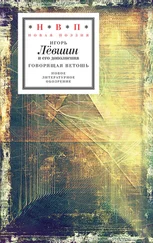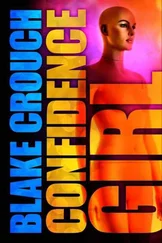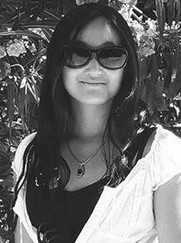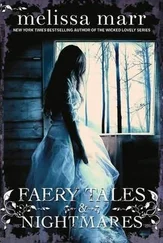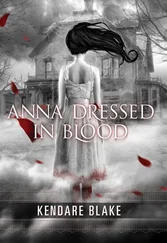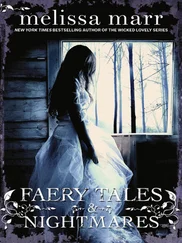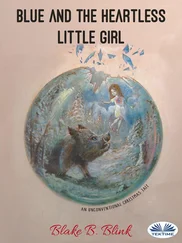“Still,” Carmel says, “even if it is a ghost, it only kills once every few years? What if it doesn’t want to kill us?”
“Well,” Thomas starts sheepishly, “after the last time we came up empty-handed, I started working on this.” He reaches into the pocket of his Army surplus jacket and pulls out a circular piece of light-colored stone. It’s flat and about one inch thick, like a large, fat coin. There’s a symbol carved into one side, something that looks like a modified Celtic knot.
“A runestone,” I say.
“It’s pretty,” Carmel says, and Thomas hands it to her. It really is well done. The carving is exact, and he’s polished it so it shines white.
“It’s a lure.”
Carmel passes it to me. A rune to lure them out, sort of like ghostly catnip. Very clever, if it works. I turn it over in my hand. It’s cool to the touch and heavy as a hen’s egg.
“So,” Thomas says, taking the runestone back and pocketing it. “Do you want to try it?”
I look at the two of them and nod.
“Let’s get going.”
* * *
The drive to Grand Marais, Minnesota, is long, and boring in the dark. Boughs of pine trees flicker in and out of the headlights, and watching the dotted line is starting to make me motion-sick. For most of the ride down I try to sleep in the backseat, or at least feign sleep, alternately eavesdropping on and tuning out their conversation. When they whisper, I know they’re talking about Anna, but they never use her name. I hear Carmel say it’s hopeless, that we’ll never find out where she went, and that even if we could, maybe we shouldn’t. Thomas doesn’t argue much; he never does where Carmel is concerned. That kind of talk used to make me angry. Now it’s just commonplace.
“Turn off,” Thomas says. “I think that might be the road.”
I crane my head over the seat as Carmel tries to navigate the Audi down something that isn’t so much a road as a mud-rutted four-by-four trail. The car has all-wheel drive, but this still poses a high risk of getting stuck. They must’ve had heavy rain here in the last day or so, and the tracks are covered over with puddles. I’m just about to tell Carmel to forget it, and to try to back out, when something black flashes up in the headlights.
We skid to a stop. “Is that it?” Carmel asks. “It” is an enormous black barn, standing at the edge of a barren field with dead stalks of plants shooting up like stray hairs. The house that it must have belonged to, along with any other buildings, has long since been torn down. All that remains is the barn, dark and alone, waiting for us in front of a forest of silent trees.
“Matches the description,” I say.
“Description nothing,” Thomas says, rooting around in his messenger bag. “We got the sketch, remember?” He pulls it out and Carmel flips on the dome light. I wish she hadn’t. There’s an instant sensation of being watched, like the light just gave away all of our secrets. Carmel’s hand jerks to turn it off, but I put my hand on her shoulder.
“Too late.”
Thomas holds the sketch up to the window, comparing it to the shadowy figure of the barn. In my opinion, it isn’t much use. It’s rough, and done in charcoal so everything is just a different shade of black. It came in the mail along with the tip, and is the product of a psychic trance. Somebody drew out his vision while he was having it. He probably should have opened his eyes and looked down at the paper. The sketch has a definite dreamlike quality, a blurring of the edges and lots of harsh lines. It looks like it was done by a four-year-old. But as I compare them, the barn and the sketch start to look more and more similar, like it isn’t really the shape that matters so much as whatever is behind the shape.
This is stupid. How many times did my father tell me that places can’t be bad? I reach into my backpack and grab the athame, then get out of the car. The puddles reach up to my shoelaces, and my feet are soaked by the time I get to the Audi’s trunk. Both Carmel’s and Thomas’s cars have been outfitted and stocked like survival outposts, with flares and blankets and enough first-aid supplies to satisfy the most paranoid hypochondriac. Thomas is beside me, stepping gingerly through the mud. Carmel pops the trunk, and we grab three flashlights and a camping lantern. We walk together in the dark, feeling our feet go numb and listening to our socks squelch inside our shoes. It’s wet and cold. Stubborn snow patches still cling to the bases of the trees and around the sides of the barn.
I’m struck again by how ominous the barn looks. Worse even than Anna’s falling-down Victorian house. It crouches like a spider, waiting for us to get just close enough, pretending to be inanimate. But that’s stupid. It’s just the cold and the dark getting under my skin. Still, I wouldn’t necessarily give a thumbs-down if someone decided to come out here with gasoline and a match.
“Here.” I hand Thomas and Carmel their fresh protection spells. Thomas puts his in his pants pocket. Carmel holds hers like a rosary. We turn on the lantern and flashlights just outside the door, which creaks back and forth like a come-hither finger. “Stay close,” I whisper, and they press in on either side.
“I tell myself every time that we’re crazy for doing this,” Carmel mutters. “Every time, I think that I’ll just wait in the car.”
“It’s not like you to stay on the sidelines,” Thomas whispers, and on my other side, I sense Carmel’s smile.
“Get a room,” I mutter, and reach forward to pull open the door.
Thomas has this annoying habit of going in hot, flashing his beam of light every which way at a million miles an hour, like he’s expecting to bust a ghost mid-haunt or something. But ghosts are shy. Or if not shy, at least cautious. Never in my life have I opened a door and found myself staring directly into a dead face. I have, however, stepped inside and instantly known I was being watched. Which is what happens now.
It’s a strange sensation, that feeling of intense awareness from somewhere behind you. When you’re watched by the dead, the sensation is weirder, because you can’t pinpoint which direction it’s coming from. It’s just there. Annoying, but there’s nothing you can do about it. Sort of like Thomas’s strobe-flashlight.
I walk to the center of the barn and set the camping lantern on the ground. The air smells heavy with dust and old hay, which is scattered across the dirt floor. When I turn a slow circle, my flashlight beam steady and careful, it whispers and crunches beneath my feet. Carmel and Thomas pay close attention and stay right beside me. I know that Thomas at least, witch that he is, can feel that we’re being watched too. His flashlight beam zips up and down the walls, seeking out the corners and the places to hide. He’s giving too much away, instead of using the light as a decoy and paying attention to the dark. The sounds of clothing are loud; Carmel’s hair rustling back and forth over her shoulder as she looks around is like a fricking waterfall.
I put my hands out and step away, letting the light from the camping lantern break through our huddled mass. Our eyes have adjusted, and Carmel and I turn off our flashlights. The barn is empty except for what looks like the skeleton of an old plow in the south corner, and the camping lantern colors the room a muted yellow.
“Is this the place?” Carmel asks.
“Well, it’s good enough to stay in for the night,” I say. “In the morning we’ll try to walk somewhere with better reception and call a tow truck.”
Carmel nods. She’s caught on. The stranded traveler act works more often than you’d think. Which is why it shows up in so many different horror movies.
Читать дальше
